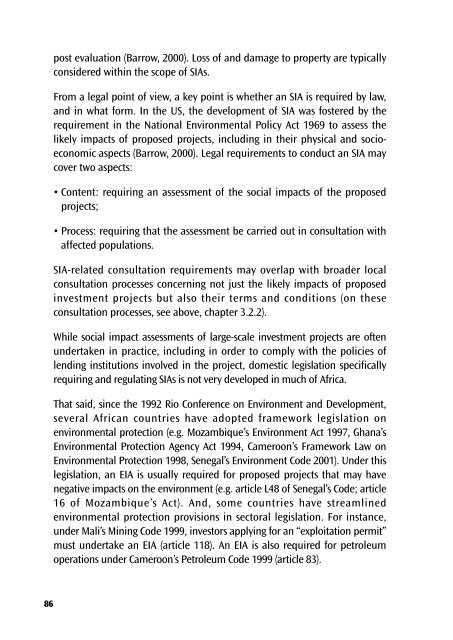Legal empowerment for local resource control
Legal empowerment for local resource control
Legal empowerment for local resource control
You also want an ePaper? Increase the reach of your titles
YUMPU automatically turns print PDFs into web optimized ePapers that Google loves.
86<br />
post evaluation (Barrow, 2000). Loss of and damage to property are typically<br />
considered within the scope of SIAs.<br />
From a legal point of view, a key point is whether an SIA is required by law,<br />
and in what <strong>for</strong>m. In the US, the development of SIA was fostered by the<br />
requirement in the National Environmental Policy Act 1969 to assess the<br />
likely impacts of proposed projects, including in their physical and socioeconomic<br />
aspects (Barrow, 2000). <strong>Legal</strong> requirements to conduct an SIA may<br />
cover two aspects:<br />
Content: requiring an assessment of the social impacts of the proposed<br />
projects;<br />
Process: requiring that the assessment be carried out in consultation with<br />
affected populations.<br />
SIA-related consultation requirements may overlap with broader <strong>local</strong><br />
consultation processes concerning not just the likely impacts of proposed<br />
investment projects but also their terms and conditions (on these<br />
consultation processes, see above, chapter 3.2.2).<br />
While social impact assessments of large-scale investment projects are often<br />
undertaken in practice, including in order to comply with the policies of<br />
lending institutions involved in the project, domestic legislation specifically<br />
requiring and regulating SIAs is not very developed in much of Africa.<br />
That said, since the 1992 Rio Conference on Environment and Development,<br />
several African countries have adopted framework legislation on<br />
environmental protection (e.g. Mozambique’s Environment Act 1997, Ghana’s<br />
Environmental Protection Agency Act 1994, Cameroon’s Framework Law on<br />
Environmental Protection 1998, Senegal’s Environment Code 2001). Under this<br />
legislation, an EIA is usually required <strong>for</strong> proposed projects that may have<br />
negative impacts on the environment (e.g. article L48 of Senegal’s Code; article<br />
16 of Mozambique’s Act). And, some countries have streamlined<br />
environmental protection provisions in sectoral legislation. For instance,<br />
under Mali’s Mining Code 1999, investors applying <strong>for</strong> an “exploitation permit”<br />
must undertake an EIA (article 118). An EIA is also required <strong>for</strong> petroleum<br />
operations under Cameroon’s Petroleum Code 1999 (article 83).

















